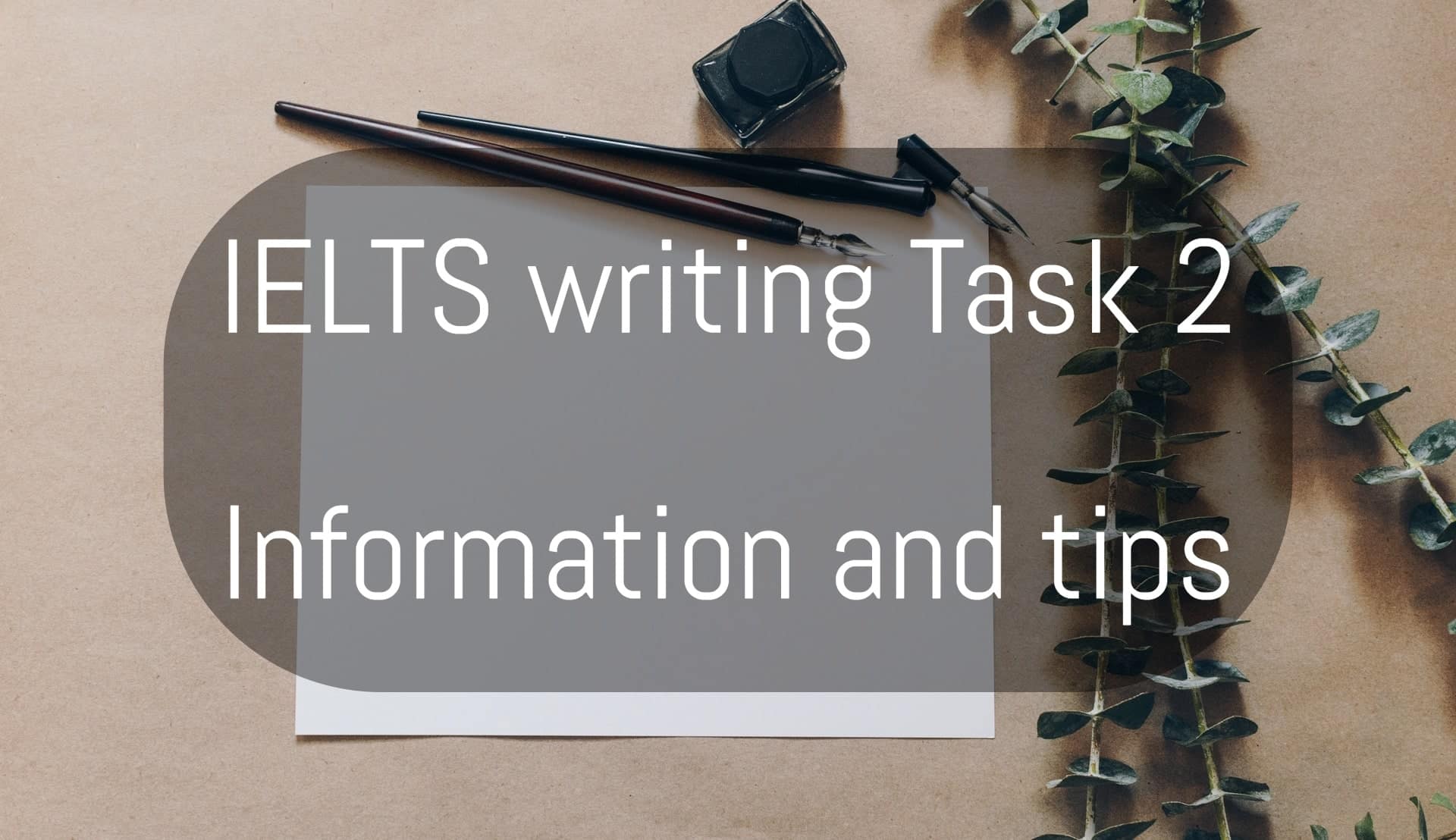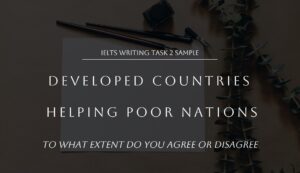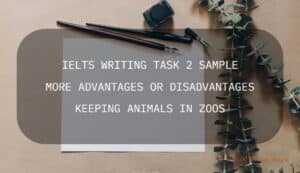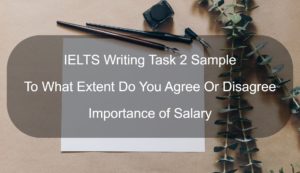The second task in the IELTS writing module is a formal discursive essay. Simply put, you will be given an opinion or a fact on a specific topic and asked one or two questions about it. Then you must answer the questions by giving reasons and facts to support the argument you make. The questions may also ask you to give your own opinion on the topic.
Basic information about IELTS writing task 2
- The word count for task 2 should be over 250. You can write as much as you want as long as it’s over 250 words. However, writing more words also means you can’t spend much time on planning and editing. It is, therefore, recommended to aim for a word count between 250 and 350 words.
- The entire writing test, including task 1 and 2, takes 60 minutes. It’s highly recommended that you spend no more than 40 minutes on task 2. You can allocate more time on task 2 and less on task 1, but it’s not a good idea.
- 2/3 of your final writing score will be determined from task 2. Task 1 is worth 1/3 of your final writing mark.
- The marking of paper-delivered and computer-delivered writing tests are the same. Your writing will be marked on task response, cohesion & coherence, lexical resources, and grammar.
- Academic writing task 2 questions are the same as those of GT. However, GT essay questions are a little easier.
- In the computer-delivered test, the computer will show the word count.
- In the computer-delivered writing test, you will be given a piece of paper and pencil so that you use them for planning.
- Task 2 is a formal essay, so make sure to use formal language.
How to structure your essay
Writing an essay in IELTS involves several steps. If you do each step well, you can produce a well-written essay. These steps include understanding the question, planning, writing, and editing. In this article, we’re going to discuss these steps briefly. Then you can read the articles that are specifically written for every type of question for more details.
The questions you’ll see in the test usually look like the ones below. You can click on each question to learn how to write an essay for it. They are from the IELTS past papers.
But before you click on them, keep reading this article to understand the basics of essay writing.
- Some people think that all university students should study whatever they like. Others believe that they should only be allowed to study subjects that will be useful in the future, such as those related to science and technology. Discuss both these views and give your own opinion.
- Nowadays, more people would rather purchase food than cook at home. What are the advantages and disadvantages of this trend? Give ideas about which is the better way according to you and why?
- In some countries, young people are encouraged to work or travel for a year between finishing high school and starting university studies. Discuss the advantages and disadvantages for young people who decided to do this?
- Some people regard video games as harmless fun or even as a useful educational tool. Others, however, believe that video games are having an adverse effect on the people who play them. In your opinion, do the drawbacks of video games outweigh the benefits?
Some people believe that unpaid community service should be a compulsory part of high school programs (for example, working for a charity, improving the neighborhood or teaching sports to younger children). Do you agree or disagree? Provide relevant examples if necessary.
- Some people believe that treating diseases is too costly, so it would be better to invest in preventive measures. To what extent do you agree or disagree?
- In some countries, many people are choosing to live alone. Do you think this is a positive or negative development?
- More and more people are migrating to cities in search of a better life, but city life can be extremely difficult. Explain some of the difficulties of living in a city. How can governments make urban life better for everyone?
Understanding the question
– In some countries, many people are choosing to live alone. Do you think this is a positive or negative development?
Once, I gave this question to a student, and she wrote a nice essay. However, she only read the question once and then started planning. She didn’t think about what the question actually was about, so she wrote about divorce rates and the reasons why people get divorced. As a result, she received a very poor score for her task response. If she had spent more time on this step (about 2 minutes), she could have received a much higher band score.
Here are the things you should pay attention to in this question:
- Choosing: This word tells you that people in those countries are not forced to live alone. It’s a personal lifestyle decision.
- Live alone: Getting divorced doesn’t necessarily mean you’ll live alone. Living alone and getting a divorce are two different things.
- Do you think: This tells you that you need to include your opinion as well.
- Positive or negative: This tells you that you need to choose a side. Do you think it’s a good thing or a bad thing? You can also take a balanced approach.
Planning your essay
This step shouldn’t take more than 8-10 minutes. Here is how you can plan for this question mentioned in the previous part:
1. Be clear about your position: I think there are some positives and some negatives. I want to take the middle ground.
2. Introduction: Paraphrase the question + Thesis statement (Summary of all my points)
A thesis statement answers the questions and tells the reader about what is going to come in the body paragraphs. If it is an opinion essay, it should also include your opinion.
3. First body paragraph: Positives
Main idea: People become more independent and self-reliant
Claim/idea 1: In control of all household and financial decisions
4. Second body paragraph: Negatives
Main idea: May cause mental and physical health issues
Claim/idea 1: People living alone are more prone to develop depression
Support: increased feelings of alienation from society→ lack of trust→ depression
Claim/idea 2: A lot of time and energy wasted on rudimentary household tasks such as shopping, paying the bills, cleaning, etc.
Support: Living alone → all tasks are done by only one person → hectic life → no free time → exhaustion
5. Conclusion: Two short sentences paraphrasing the thesis statement
Writing your essay
Once you’ve planned your essay the right way, you’re ready to start writing without stopping to think about the next sentence. Everything is there for you to pick up and weave them together. You should be able to complete this step in about 20 minutes if your planning has been done right.
Editing your essay
Everyone makes mistakes! Even skilled writers need to re-read their work to edit and revise. Once you’ve written all your paragraphs, read the essay from top to bottom and correct the mistakes you have made. You may even want to change some vocabulary items to make your point more precise.
You should spend about 8 minutes on this step. Here is the checklist for your editing your task 2.
1. Is your argument to the point? Have you addressed the task completely?
2. Do you have a separate paragraph for each main idea? Is the paragraphing done right?
3. Have you used enough linking devices? Are they appropriately used?
3. Is your referencing clear?
4. Have you used appropriate language? Are all your words and phrases formal?
5. Are your vocabulary choices appropriate?
6. Have you used punctuation marks appropriately?
7. Are your sentence structures easy to understand? Revise you complicated sentence and make them easily understood.
8. Finally, check your spellings, and get rid of all your dictation mistakes.
Follow us on YouTube for more tips and resources.





